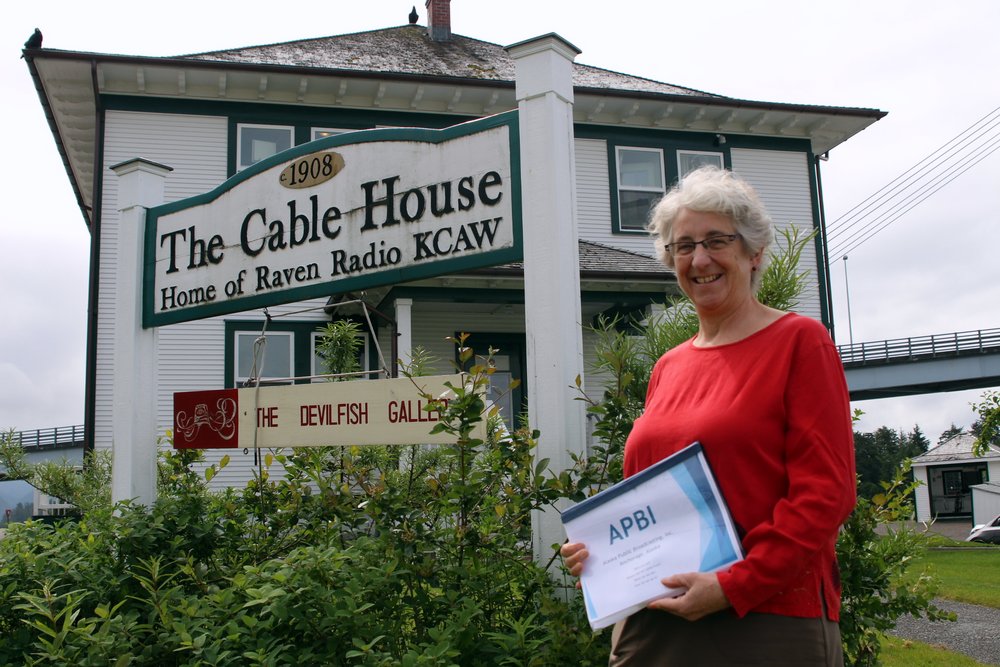
Mollie Kabler began her career in radio as a volunteer at KCAW in Sitka in the mid-1980s. As of July 1, she’ll be running both CoastAlaska and Alask Public Broadcasting, Inc. from her office in the Cable House. A familiar voice on Southeast airwaves, Kabler has co-hosted KCAW’s “Garden Show” (with Kitty LaBounty) for 25 years. (KCAW photo/Robert Woolsey)
The newest face in statewide public broadcasting in Alaska is one you won’t see on your television screens.
Mollie Kabler has been the executive director of CoastAlaska for over 11 years. As of July 1st, she’ll also be running Alaska Public Broadcasting, Inc., and the Alaska Rural Communication System, known as ARCS Television.
It’s a joint venture that the respective organizations hope will streamline the state’s huge public broadcasting network.
The most interesting thing about public radio in Alaska that you probably never knew is that the station you’re listening to now is independently managed, but shares financial and engineering services with other stations.
In Southeast Alaska, those shared services are coordinated in an organization called CoastAlaska. Try and picture your favorite station and its programs — whether it’s KCAW, KTOO, KRBD, KFSK, or KSTK — as the art, and CoastAlaska as the canvas.
Throughout the rest of state, Alaska Public Broadcasting Inc. is the canvas. As of July 1, Mollie Kabler will be running both from her office in Sitka’s Cable House.
“Both of the organizations, CoastAlaska and we’ll call it APBI for short, are service bureaus. That’s how we’ve described them. They’re an organization that provides service to other organizations. And in our case, to all the public media stations in Alaska.”
So it’s Kabler’s name on the paychecks, and Kabler who maintains a clerical and accounting staff, an engineering department, and who employs a regional news director. But — and people trip over this all the time — except for her office, she’s not anyone’s boss.
“We don’t run those stations in CoastAlaska. There’s a general manager and a staff and a board that work on local content, and local fundraising. It’s similar for APBI, the services that are offered: Engineering — rural station engineering — is a really big service that is offered by APBI. But neither organization runs stations.”
This model has worked well. CoastAlaska has brought seven additional stations outside of Southeast under its financial services umbrella. And this helps give it purchasing power. Both CoastAlaska and APBI make “group buys” of some of the most popular programs on public radio, so that small stations can afford to play them.
Kabler is succeeding Jamie Waste, who left APBI last October. Waste was also her predecessor at CoastAlaska. Kabler says the APBI board met in February to discuss whether a partnership with CoastAlaska would create efficiency in the statewide public broadcasting system. In the end, the two organizations settled on a Joint Venture with Kabler as Executive Director.
Kabler has been involved in the discussion for months.
“I’m excited about it for a couple of reasons. One is: the experiment that CoastAlaska has been for 20 years has been described as successful across the nation by keeping local media local, but finding efficiencies to work together. And one of the things that happens when you work together is that you learn a lot about each other, and you improve services because you have colleagues who do the exact thing you do. So this is an opportunity for us to work together even more in the state, and that’s the way we’re going to survive and have a collectively strong public media system in the face of challenging economic times in our state.”
One new challenge for Kabler is television. The Alaska Rural Communication System — or ARCS — is a state-owned service covering 192 locations in Alaska. APBI operates it under contract with the state.
Kabler says there are challenges.
“It’s a legacy service, but a lot of people in rural Alaska depend on it for news and information every day.”
Kabler says there has not been much extra funding for ARCS lately, and much of the infrastructure is growing “tired.” Nevertheless, she’s optimistic.
“The staff at APBI are few and talented, and they’ll continue — I’m sure — to do really great work, and I’m excited to have the opportunity to work with them and the work that they do keeping public media and ARCS and the rural engineering service going.”
Kabler will continue to work out of her office in Sitka, but along with frequent trips to Juneau she’s expecting to travel often to Anchorage.
The joint venture agreement between CoastAlaska and APBI has no end date. Kabler says the two organizations will continue to work together until “we decide what the next step is.”
Do you catch KCAW online? If you click, stream, or scroll through Raven Radio’s content, we need your help now!































